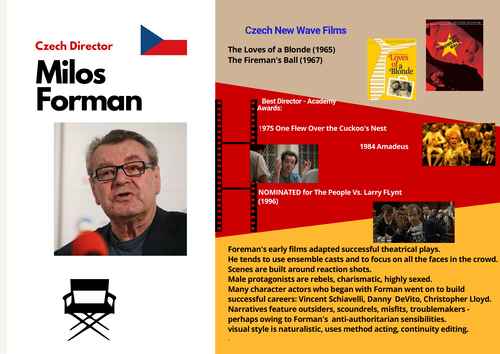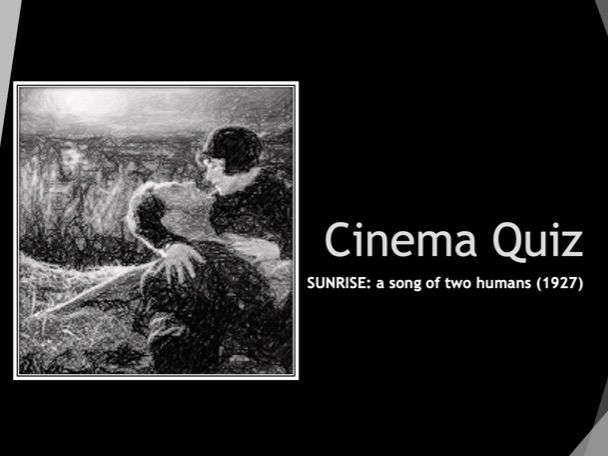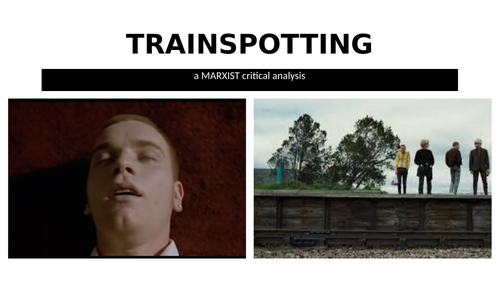57Uploads
12k+Views
2k+Downloads
Art and design

Fish Tank (Andrea Arnold, UK, 2009) HOMEWORK QUESTIONS
Useful for the EDUQAS Film A-Level.
12 questions covering representations, class, ideology, narrative and ‘the female gaze’.

Milos Forman Auteur Director Poster
This full colour poster outlines Czech-American film director Milos Forman’s key directorial attributes and achievements.
Perfect for the Auteur study question on the Eduqas Film Studies A-Level curriculum.

Analysing Class representations in TRAINSPOTTING and FISH TANK (Arnold, 2009)
For **FILM STUDIES A-LEVEL **
This class exercise allows students to consider class representations in the 2009 UK independent film Fish Tank.
It will prompt discussion and allow students to think about how a variety of characters are represented.
The objective is for students to fill in their worksheets independently or in pairs, and then for each individual or pair to feedback to the whole group. In this way, a wide range of answers and insights can be explored.
The exercise could fill nearly an entire 1 hour lesson, depending upon the group size.

Billy Wilder - Auteur Poster
This colourful poster outlines the key ‘signature’ features distinctive of WIlder’s films It makes an attractive classroom display that also provides helpful memory prompts for Eduquas A-Level Film Studies Students who are sitting the Component 1. Exam Paper.

Winter's Bone Ideology Graphic
This Graphic provides an overview of the key ideological issues for the film Winter’s Bone. There are other possibilities for the A-Level Film Studies Exam (such as gender or class) but this graphic provides possibly the best understanding of the more subtle political ideologies within the narrative and their contexts than the more ‘identity’ based approach to ideology.
This graphic places the film within its concurrent social and political contexts, and these bear upon how the film will be** ‘de-coded’** (vis. Stuart Hall’s theory) by viewers, depending upon the background knowledge they bring to their viewing experience. Therefore, this resource provides possibilities for** spectatorship issues** as well as ideology.

Trainspotting - Ideologies
For the** EDUQAS Film Studies A Level** Component 1C. British Films, this resource provides a great exam revision preparation lesson. This is a 24 slide PowerPoint including interactive activities that allow students to reflect on ideological meanings and to share their ideas.
The resource is focused on the EDUQAS A Level examination, and includes past questions to guide pupils in how to craft good answers targeted on ideological analysis. Includes key prompts and talking points for ideology and a sample binary analysis.

EDUQAS A Level Film Studies - Gender in Some Like It Hot
This 25 Slide PowerPoint Presentation can be used for an hour long lesson on gender representations in Billy Wilder’s 1959 film ‘Some Like It Hot’. This can be used for the Component 1A. American Film Exam preparation in Film Studies, or it could be useful in AS Film Studies or Media Studies to discuss gender transgression, homoerotic subtext and feminist themes or messages in the film.
The film challenges gender binaries and stereotypes and cleverly uses subtext and indirect or double meanings to get across its progressive messages in subtle ways that would not have alienated 1950’s American audiences.
This is an interactive presentation that ends with a 15 minute exercise.

Film Studies A-Level Revision Quiz (Sunrise, 1927)
This is a great revision exercise for the EDUQAS Film Studies A-Level, Component 2, Global Filmmaking Perspectives: Silent Cinema.
This is a 20 slide Quiz presented in PowerPoint.
It works well for team or small group competitions.

Director Andrea Arnold - Her Auteur Signature
Studying FISH TANK (UK, 2009) for the Film or Media A-Level?
Or perhaps you are just looking for a film with empowered female leads?
Maybe you want to think about the concept of an ‘auteur’ director?
This resource also gives some tips for studying ideology in films.
Suited to 14+ age groups, this resource can be used for the EDUQAS Film Studies A-Level or AS Level, or just as an introduction to the concept of ‘Auteur’ directors or ideology.

'Captain Fantastic' Scene Analysis
For Eduqas A Level Film Studies, this 43-slide full colour interactive presentation prepares students to analyse how cinematography and mise-en-scene are used to convey key narrative meanings. Students are encouraged to question, discuss and share their own thoughts and there is a strong emphasis on uses of cinematic terminology as well as analysis and exam preparation (with a practice exam question).

A-Level Film Studies: Sunrise (Murnau, 1927) Close Study
This GERMAN EXPRESSIONIST film from the late silent period showcases many features of German Expessionist cinema, as well as being a key example of a film made in Hollywood for an American audience. Made in 1927 by Fox Studio, this film forms the basis of a lesson around German Expressionist cinema and its visual techniques. This 32-Slide presentation provides lots of detail as well as explanation about how certain visual effects were achieved.
Ideal for teachers fdollowing the EDUQAS Film Studies A-Level, Component 2.

British Film Since 1995 (Eduqas A Level Film Studies Revision)
This 30 full colour , interactive PowerPoint Presentation is the ideal revision tool to prepare students for the A-Level Film Studies exam paper (Component 1C.).
THe two films refrenced are Trarispotting (Boyle, 1996) and Fish Tank (Arnold, 2009).
The resource closely follows the Eduqas Examination Board’s advice and guidance on how to approach ideologies. There are example questions from past papers, discussion prompts and class exercises as well as an essay structure scaffold.
This could be used on conjunction with the two films to teach ideologies and narrative, and provides example binary analyses - a tool for ideological analysis that is transferable to any narrative.

Moonlight - A Level Film Studies EXAM FOCUS
This 25 slide full colour PowerPoint Presentation provides helpful exam preparation for ideology and spectatorship (Eduqas Film Studies Component 1B.). The resource is closely focused on what examiners will expect, and offers talking points, discussion questions, and commentary on core study areas and representation.

A Marxist Analysis of TRAINSPOTTING
This 35-slide PowerPoint Presentation can be used for the ‘ideologies’ study of Trainspotting for the Eduqas A Level Film Studies Component 1C. (British Films).
It provides a full interactive 2 hour lesson plan with focus on exams. Marxist ideology is introduced gently with a few key concepts including: class struggle, alienation, exploitation, consumerism, commodity fetishisaton and false consciousness.
Marxist concepts are applied to particular aspects of the film’s mise-en-scene and to particular sequences. Issues are explored through discussion with lots of question prompts to allow discussion and debate.

Captain Fantastic: Ideology & Spectatorship
This is a 27 slide interactive PowerPoint to prepare pupils for the Eduqas A Level Film Studies, Component 1B. exam.
Ideology and Spectatorship are explored and applied to the film Captain Fantastic (Ross, 2016) with lots of questions for pupils to ponder and discuss throughout.
Helpful ‘talking points’ about how to interpret the ideological positioning of the Cash family.
Theory: Laura Mulvey’s ‘male gaze’ is touched on as is Stuart Hall’s reception theory. The presentation is designed to provide two-hour lesson plan.

Identity in Trainspotting
This is a 50 slide full colour PowerPoint Presentation on national identity versus British identity (as well as multicultural, globalized Britain) in the 1996 film Trainspotting (Danny Boyle).
This is very useful for** EDUQAS A Level Film Studies** because of the focus on representations in the film, including how particular aspects of **mise-en-scene **link to identity, narrative themes and character.
This presentation can be used to study the film’s binary oppositions and how Scotland and London come to represent different outlooks, rather than just different geographical locations.

Scottish Identity in TRAINSPOTTING
This study of the 1996 film TRAINSPOTTING by Danny Boyle explores how Scottish identity and culture are represented in the film.
This is a 46 Slide PowerPoint Presentation and it comprises sufficient material for a comprehensive lesson plan. This is useful for media studies, film studies and cultural studies. The resource explores how stereotypes, identity and representations are constructed in a media text.

One Flew Over the Cuckoo's Nest - Close Analysis
This Resource is a 44 Slide interactive PowerPoint Presentation offering students a lot of room for discussion and debate around the identity politics within the film, as well a the contextual issues that would have influenced the narrative and the filmmakers (as well as the novelist).
Students are encouraged to reflect and to discuss, activities get them involved in dissecting the film’s meanings - both literal and subtextual.
Perfect revision for the Eduqas A-Level Film Studies Component 1A. Paper.
https://resource.download.wjec.co.uk/vtc/2017-18/17-18_3-7/eng/sam2-component-1.pdf

EDUQAS FILM STUDIES A LEVEL REVISION, Component 1C. British Films
This is a fully animated, full colour interactive 32 slide Power Point Presentation.
It provides an excellent lesson plan for a two hour lession, and includes four practice questions from past papers, with lots of suggestions on how to tackle 'ideologies’ questions. It suggests some binary analyses of the films Trainspotting and Fish Tank and provides some indicative content tips from the exam boards.
Much of the content is based on advice from EDUQAS Film Studies examiners.

Sisters in Law (Documentary) Close Study
This 37 full colour slide presentation provides an overview of the issues and filmmaking practices deployed in the production of Sisters in Law, a documentary by British filmmaker Kim Longinotto and Cameroonian filmmaker Florence Ayisi. The lesson revolves around the cinema verite practices used, transnational feminism, ‘post-feminism’ and its clichés, issues of representation, and the struggle for women’s rights within societies that are culturally mixed and traditionally patriarchal. Although these are complex issues, the resource is aimed at an A-Level (Year 12 / 13) learner, following the EDUQAS Film Studies Curriculum.
For this reason, there is focus on the filmmaking practices used as well as the human rights issues within the documentary. The presentation ends with an exam question from the Eduqas A Level Film Studies Specification, so that film studies students can apply the learning from the presentation. However, this resource could also form an interesting resource for social studies, media studies or African cultural studies. The human rights issues make this a widely applicable resource that could be useful across a variety of subjects. The content should fill a two-hour lesson and provides ample scope for class discussions and (for A-Level FIlm Students) exam practice.




















